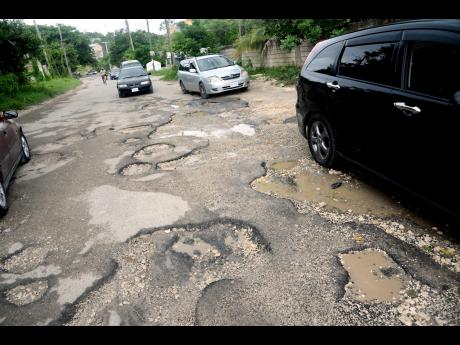Warranty on roads - Ashley suggests measure to hold contractors to guaranteed standards
Suggesting a system of warranty on road repairs in Jamaica to stem the flow of taxpayers' money down the drain, political commentator Dr Paul Ashley is arguing that contractors should bear the cost of repairing roads that fall into disrepair a short while after they are constructed.
Making a link between the financing of political parties and what he described as the best return on investment in the form of road contracts, Ashley called for greater accountability in the inspection of roads.
"You cannot look at the problem of corruption being divorced from party financing. People, companies, contractors and professionals invest financially in political parties to get some returns; roadwork offers the greatest returns," Ashley contended.
He questioned why roads in many other countries last for decades, while, in Jamaica, they sometimes fail to reach the five-year mark before major flaws show up.
"The repairs need to have a warranty, and part of the funds should be withheld until the warranty period is over. It's no use I get a contract, sign a warranty, and then after I get the money, I migrate," he asserted.
Ashley insisted that proper inspection be done during the construction phase and the work certified by reputable inspectors.
"Nobody tries to build a road that lasts for a very long time in Jamaica," Ashley maintained, adding that contractors make significant sums by repairing roads.
Ashley's comments came against the background of yesterday's Sunday Gleaner article by head of the National Integrity Action, Professor Trevor Munroe, on the issue of 'Ridding road repairs of political corruption'.
In his commentary, Munroe highlighted that the Global Competitiveness Report 2016-2017 placed Jamaica at 79 out of 138 countries regarding quality of roads.
According to Munroe, the bad roads, which Jamaicans "justly" protest against, put the country in the bottom half of the quality of roads measure, despite Highway 2000. "It is, therefore, cold comfort that five years ago, our score and ranking globally were much lower."
DENSE ROAD NETWORK
In addition, the National Security Policy for Jamaica 2013, which was laid in Parliament in April 2014 by then Prime Minister Portia Simpson Miller, described the country as having one of the most dense road networks in the world. It also described Jamaica's road network as one of the worst in terms of the percentage of roads in good condition.
Munroe pointed out that the Security Policy attributed the unsatisfactory condition of the road network primarily to political corruption.
"The direction of public works contracts into the hands of political affiliates has ... been particularly damaging, as this has often resulted in unnecessarily expensive or poor-quality infrastructure," the report stated.
"A contract to build a road might provide an opportunity to reward political affiliates, and shoddy road construction would ensure that the road surface would crumble, which would then allow the issuing of another contract, to resurface the roads," the report further outlined.
The political commentator also called for key state agencies to work in a coordinated way to avoid spending additional resources to repair dug-up roads that were recently repaired or constructed.


